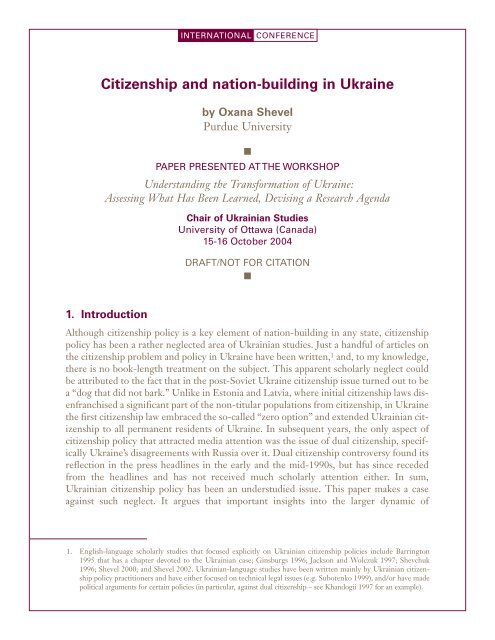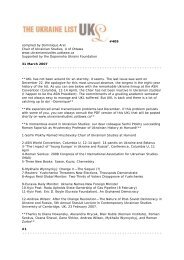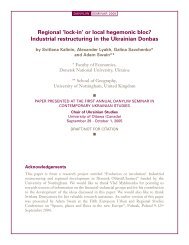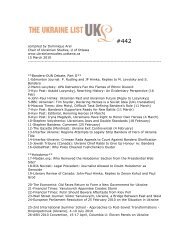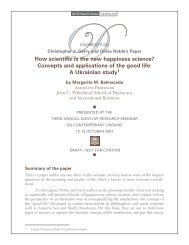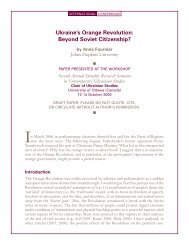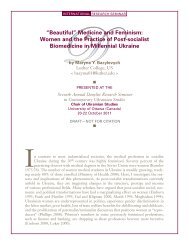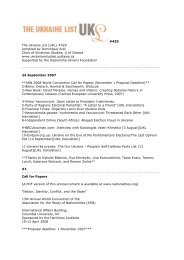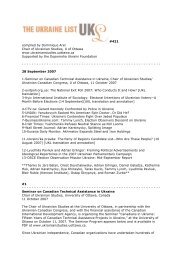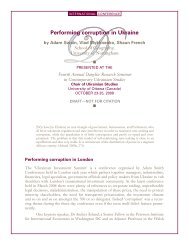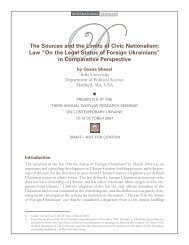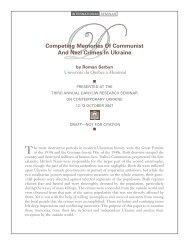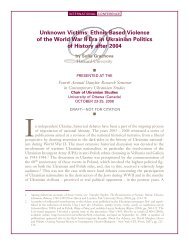Citizenship and nation-building in Ukraine - Chair of Ukrainian Studies
Citizenship and nation-building in Ukraine - Chair of Ukrainian Studies
Citizenship and nation-building in Ukraine - Chair of Ukrainian Studies
Create successful ePaper yourself
Turn your PDF publications into a flip-book with our unique Google optimized e-Paper software.
INTERNATIONAL CONFERENCE<br />
<strong>Citizenship</strong> <strong>and</strong> <strong>nation</strong>-<strong>build<strong>in</strong>g</strong> <strong>in</strong> Ukra<strong>in</strong>e<br />
by Oxana Shevel<br />
Purdue University<br />
■<br />
PAPER PRESENTED AT THE WORKSHOP<br />
Underst<strong>and</strong><strong>in</strong>g the Transformation <strong>of</strong> Ukra<strong>in</strong>e:<br />
Assess<strong>in</strong>g What Has Been Learned, Devis<strong>in</strong>g a Research Agenda<br />
<strong>Chair</strong> <strong>of</strong> Ukra<strong>in</strong>ian <strong>Studies</strong><br />
University <strong>of</strong> Ottawa (Canada)<br />
15-16 October 2004<br />
DRAFT/NOT FOR CITATION<br />
■<br />
1. Introduction<br />
Although citizenship policy is a key element <strong>of</strong> <strong>nation</strong>-<strong>build<strong>in</strong>g</strong> <strong>in</strong> any state, citizenship<br />
policy has been a rather neglected area <strong>of</strong> Ukra<strong>in</strong>ian studies. Just a h<strong>and</strong>ful <strong>of</strong> articles on<br />
the citizenship problem <strong>and</strong> policy <strong>in</strong> Ukra<strong>in</strong>e have been written, 1 <strong>and</strong>, to my knowledge,<br />
there is no book-length treatment on the subject. This apparent scholarly neglect could<br />
be attributed to the fact that <strong>in</strong> the post-Soviet Ukra<strong>in</strong>e citizenship issue turned out to be<br />
a “dog that did not bark.” Unlike <strong>in</strong> Estonia <strong>and</strong> Latvia, where <strong>in</strong>itial citizenship laws disenfranchised<br />
a significant part <strong>of</strong> the non-titular populations from citizenship, <strong>in</strong> Ukra<strong>in</strong>e<br />
the first citizenship law embraced the so-called “zero option” <strong>and</strong> extended Ukra<strong>in</strong>ian citizenship<br />
to all permanent residents <strong>of</strong> Ukra<strong>in</strong>e. In subsequent years, the only aspect <strong>of</strong><br />
citizenship policy that attracted media attention was the issue <strong>of</strong> dual citizenship, specifically<br />
Ukra<strong>in</strong>e’s disagreements with Russia over it. Dual citizenship controversy found its<br />
reflection <strong>in</strong> the press headl<strong>in</strong>es <strong>in</strong> the early <strong>and</strong> the mid-1990s, but has s<strong>in</strong>ce receded<br />
from the headl<strong>in</strong>es <strong>and</strong> has not received much scholarly attention either. In sum,<br />
Ukra<strong>in</strong>ian citizenship policy has been an understudied issue. This paper makes a case<br />
aga<strong>in</strong>st such neglect. It argues that important <strong>in</strong>sights <strong>in</strong>to the larger dynamic <strong>of</strong><br />
1. English-language scholarly studies that focused explicitly on Ukra<strong>in</strong>ian citizenship policies <strong>in</strong>clude Barr<strong>in</strong>gton<br />
1995 that has a chapter devoted to the Ukra<strong>in</strong>ian case; G<strong>in</strong>sburgs 1996; Jackson <strong>and</strong> Wolczuk 1997; Shevchuk<br />
1996; Shevel 2000; <strong>and</strong> Shevel 2002. Ukra<strong>in</strong>ian-language studies have been written ma<strong>in</strong>ly by Ukra<strong>in</strong>ian citizenship<br />
policy practitioners <strong>and</strong> have either focused on technical legal issues (e.g. Subotenko 1999), <strong>and</strong>/or have made<br />
political arguments for certa<strong>in</strong> policies (<strong>in</strong> particular, aga<strong>in</strong>st dual citizenship – see Kh<strong>and</strong>ogii 1997 for an example).
INTERNATIONAL CONFERENCE<br />
Ukra<strong>in</strong>ian state <strong>and</strong> <strong>nation</strong>-<strong>build<strong>in</strong>g</strong> can be ga<strong>in</strong>ed from the study<strong>in</strong>g citizenship policy.<br />
This paper will thus first <strong>of</strong>fer an analysis <strong>of</strong> Ukra<strong>in</strong>ian citizenship policy <strong>and</strong> politics<br />
over, <strong>and</strong> will then suggest ways <strong>in</strong> which the Ukra<strong>in</strong>ian case <strong>in</strong> particular, <strong>and</strong> citizenship<br />
policy studies <strong>in</strong> general, can be <strong>in</strong>tegrated <strong>in</strong>to broader social scientific research<br />
agendas.<br />
2. <strong>Citizenship</strong> policy <strong>and</strong> politics <strong>in</strong> <strong>in</strong>dependent Ukra<strong>in</strong>e.<br />
The “<strong>of</strong>ficial” <strong>nation</strong> <strong>in</strong> the citizenship law<br />
<strong>Citizenship</strong> policy has many aspects <strong>and</strong> can be studied from many angles. Legal policy<br />
scholars tend to scrut<strong>in</strong>ize the citizenship laws’ compatibility with the <strong>in</strong>ter<strong>nation</strong>al legal<br />
pr<strong>in</strong>ciples. Social scientists generally focus on the relative <strong>in</strong>clusively or exclusivity <strong>of</strong> citizenship<br />
laws, <strong>and</strong> analyzes reasons for cross-<strong>nation</strong>al variations <strong>in</strong> this regard. Who is<br />
<strong>in</strong>cluded <strong>in</strong>to the <strong>in</strong>itial body <strong>of</strong> citizens <strong>in</strong> a new state? What criteria must subsequent<br />
applicants for citizenship fulfill? Who is entitled to ga<strong>in</strong> citizenship under simplified<br />
rules? <strong>Citizenship</strong> laws provide <strong>of</strong>ficial answers to these questions, <strong>and</strong> by do<strong>in</strong>g so del<strong>in</strong>eate<br />
the <strong>of</strong>ficial boundary between the “us” <strong>and</strong> the “other” <strong>of</strong> a given state. <strong>Citizenship</strong><br />
laws thus def<strong>in</strong>e what can be called the “<strong>of</strong>ficial” <strong>nation</strong> <strong>of</strong> a given state: the <strong>in</strong>itial body<br />
<strong>of</strong> citizens <strong>and</strong> those who are entitled to become citizens under a simplified procedure.<br />
Let us consider how Ukra<strong>in</strong>e def<strong>in</strong>ed its <strong>of</strong>ficial <strong>nation</strong>, <strong>and</strong> why the <strong>of</strong>ficial <strong>nation</strong> was<br />
def<strong>in</strong>ed this particular way.<br />
Table 1 illustrates how the def<strong>in</strong>ition <strong>of</strong> the “<strong>of</strong>ficial” Ukra<strong>in</strong>ian <strong>nation</strong> has<br />
evolved over the decade <strong>of</strong> Ukra<strong>in</strong>e’s <strong>in</strong>dependence. As we can see, the citizenship law<br />
def<strong>in</strong>es the <strong>nation</strong> by the territory <strong>of</strong> the states. This def<strong>in</strong>ition was reflected already <strong>in</strong><br />
the 1991 citizenship law, <strong>and</strong> was upheld <strong>and</strong> broadened <strong>in</strong> the subsequent editions <strong>of</strong> the<br />
law adopted <strong>in</strong> 1997 <strong>and</strong> <strong>in</strong> 2001.<br />
TABLE 1<br />
“OFFICIAL” UKRAINIAN NATION IN CITIZENSHIP LEGISLATION,<br />
1991-2001<br />
1991 citizenship law April 1997 amendments 2001 citizenship law<br />
to the 1991 law<br />
Those who were born on the<br />
territory <strong>of</strong> Ukra<strong>in</strong>e, or at<br />
least one <strong>of</strong> whose parents or<br />
gr<strong>and</strong>parents was born <strong>in</strong><br />
Ukra<strong>in</strong>e<br />
Those who were born on or<br />
permanently resided on the<br />
territory <strong>of</strong> Ukra<strong>in</strong>e, <strong>and</strong> their<br />
descendents (children, gr<strong>and</strong>children)<br />
Those who were born or<br />
permanently resided on the<br />
territory <strong>of</strong> Ukra<strong>in</strong>e, or at<br />
least one <strong>of</strong> whose parents,<br />
gr<strong>and</strong>parents, a full-blood<br />
brother or a sister, was born<br />
or permanently resided on the<br />
territory <strong>of</strong> Ukra<strong>in</strong>e<br />
2
INTERNATIONAL CONFERENCE<br />
The 1991 citizenship law, adopted when the Soviet Union was still legally <strong>in</strong> existence, 2<br />
def<strong>in</strong>ed the “<strong>of</strong>ficial” <strong>nation</strong> as those who, at the time <strong>of</strong> the law’s entry <strong>in</strong>to force, were<br />
permanently resid<strong>in</strong>g <strong>in</strong> Ukra<strong>in</strong>e, who were not citizens <strong>of</strong> other states, <strong>and</strong> who did not<br />
object to becom<strong>in</strong>g citizens <strong>of</strong> Ukra<strong>in</strong>e, plus those who have previously permanently<br />
resided <strong>in</strong> Ukra<strong>in</strong>e but at the time <strong>of</strong> the law’s entry <strong>in</strong>to force were abroad study<strong>in</strong>g,<br />
work<strong>in</strong>g on state bus<strong>in</strong>ess, or serv<strong>in</strong>g <strong>in</strong> the armed forces. 3<br />
This group – those who were born, or had at least one parent or gr<strong>and</strong>parent born<br />
on the territory <strong>of</strong> Ukra<strong>in</strong>e – has become the “<strong>of</strong>ficial” Ukra<strong>in</strong>ian <strong>nation</strong>, eligible to<br />
acquire citizenship under a simplified procedure. New edition <strong>of</strong> the citizenship law<br />
approved <strong>in</strong> April 1997 extended the “<strong>of</strong>ficial” <strong>nation</strong> to <strong>in</strong>clude those who permanently<br />
resided (<strong>in</strong> addition to those born) on the territory <strong>of</strong> Ukra<strong>in</strong>e, plus their children <strong>and</strong><br />
gr<strong>and</strong>children. 4 The latest edition <strong>of</strong> the citizenship law approved <strong>in</strong> January 2001 added<br />
brothers <strong>and</strong> sisters <strong>of</strong> those who were born or permanently resided on the territory <strong>of</strong><br />
Ukra<strong>in</strong>e to the “<strong>of</strong>ficial” <strong>nation</strong>. The simplified procedure under which those def<strong>in</strong>ed as<br />
belong<strong>in</strong>g to the <strong>nation</strong> were eligible to acquire citizenship was been made simpler with<br />
each edition <strong>of</strong> the law. Thus, the 1991 law exempted those who were born, or had at<br />
least one <strong>of</strong> the parents or gr<strong>and</strong>parents born on the territory <strong>of</strong> Ukra<strong>in</strong>e, from 5 year<br />
residency requirement, 5 the 1997 law exempted them from residency <strong>and</strong> language<br />
requirement, 6 while the 2001 law additionally exempted this group from requirements to<br />
present documentary evidence <strong>of</strong> the legal source <strong>of</strong> <strong>in</strong>come <strong>and</strong> a pro<strong>of</strong> <strong>of</strong> release from<br />
prior citizenship at the time <strong>of</strong> application. 7<br />
Theories <strong>of</strong> citizenship policy <strong>and</strong> the Ukra<strong>in</strong>ian case.<br />
Ukra<strong>in</strong>e’s citizenship law thus def<strong>in</strong>ed the <strong>of</strong>ficial <strong>nation</strong> territorially. The question to ask<br />
is why the <strong>of</strong>ficial <strong>nation</strong> was def<strong>in</strong>ed this particular way. More generally, how does the<br />
political elites arrive at a particular def<strong>in</strong>ition <strong>of</strong> the “<strong>of</strong>ficial” <strong>nation</strong>? Scholars <strong>of</strong> citi-<br />
2. Draft 1991 citizenship law was first debated <strong>in</strong> the Rada <strong>in</strong> July 1991; repeated first read<strong>in</strong>g took place on<br />
12 September 1991; the law was approved on 8 October 1991 <strong>and</strong> entered <strong>in</strong>to force on 13 November 1991.<br />
3. Article 2 paragraphs 1 <strong>and</strong> 2 <strong>of</strong> the 1991 citizenship law, text <strong>of</strong> the law <strong>in</strong> Pravda Ukra<strong>in</strong>y, 14 November 1991.<br />
Under the 1991 law, the latter group (those study<strong>in</strong>g, work<strong>in</strong>g on state bus<strong>in</strong>ess, or serv<strong>in</strong>g <strong>in</strong> the armed forces)<br />
could become citizens <strong>of</strong> Ukra<strong>in</strong>e if they were not citizens <strong>of</strong> other states <strong>and</strong> declared their desire to become citizens<br />
<strong>of</strong> Ukra<strong>in</strong>e with<strong>in</strong> one year after the law’s entry <strong>in</strong>to force. This deadl<strong>in</strong>e was extended to two years <strong>in</strong> January<br />
1993 <strong>and</strong> to five years <strong>in</strong> October 1994. See Verkhovna Rada Ukra<strong>in</strong>y 1993; Verkhovna Rada Ukra<strong>in</strong>y 1994.<br />
4. Article 2 paragraph 3 <strong>of</strong> the 1997 law, for text <strong>of</strong> the law see Verkhovna Rada Ukra<strong>in</strong>y 1997a.<br />
5. Article 17 paragraph 2 <strong>of</strong> the 1991 law.<br />
6. Article 16 <strong>of</strong> the 1997 law.<br />
7. Article 8 <strong>of</strong> the 2001 law. The 2001law still required these persons to present a pro<strong>of</strong> <strong>of</strong> release from prior citizenship<br />
with<strong>in</strong> a year after submitt<strong>in</strong>g citizenship application. For text <strong>of</strong> the law see Verkhovna Rada Ukra<strong>in</strong>y<br />
2001a.<br />
3
INTERNATIONAL CONFERENCE<br />
zenship policies have advanced hypotheses about factors that drive citizenship policies <strong>in</strong><br />
modern states. Follow<strong>in</strong>g Rogers Brubaker’s sem<strong>in</strong>al study <strong>of</strong> French <strong>and</strong> German citizenship<br />
policies, conventional wisdom today attributes variation <strong>in</strong> rules govern<strong>in</strong>g<br />
admittance to citizenship to <strong>nation</strong>al identity. 8 Or, to use Brubaker’s term, to historically-formed<br />
<strong>and</strong> deeply-rooted “habits <strong>of</strong> <strong>nation</strong>al self-underst<strong>and</strong><strong>in</strong>g” 9 that are “prior to<br />
<strong>and</strong> <strong>in</strong>dependent <strong>of</strong> the [modern] state.” 10 Accord<strong>in</strong>g to Brubaker, <strong>in</strong> modern states these<br />
habits <strong>of</strong> <strong>nation</strong>al self-underst<strong>and</strong><strong>in</strong>g are the ma<strong>in</strong> source <strong>of</strong> citizenship laws, <strong>and</strong> the factor<br />
expla<strong>in</strong><strong>in</strong>g cross-<strong>nation</strong>al divergence. 11<br />
If we try to apply Brubaker’s theory to the Ukra<strong>in</strong>ian case, however, we will immediately<br />
run <strong>in</strong>to problem. Brubaker’s argument implies that each modern state has one<br />
historically-formed <strong>nation</strong>al identity (a particular “habit <strong>of</strong> <strong>nation</strong>al self-underst<strong>and</strong><strong>in</strong>g”).<br />
This assumption is however an empirical matter. A “dom<strong>in</strong>ant habit <strong>of</strong> <strong>nation</strong>al selfunderst<strong>and</strong><strong>in</strong>g”<br />
may form historically <strong>in</strong> some states but not <strong>in</strong> others. In states such as<br />
Ukra<strong>in</strong>e, that emerge suddenly from the rubble <strong>of</strong> multi<strong>nation</strong>al empires, there may be<br />
no dom<strong>in</strong>ant habit <strong>of</strong> <strong>nation</strong>al self-underst<strong>and</strong><strong>in</strong>g. Indeed, virtually all studies <strong>of</strong> the post-<br />
Soviet Ukra<strong>in</strong>e make a po<strong>in</strong>t that the past rule <strong>of</strong> territories <strong>of</strong> today’s Ukra<strong>in</strong>e by different<br />
empires <strong>and</strong> states, <strong>and</strong> result<strong>in</strong>g cultural, ethnic, l<strong>in</strong>guistic <strong>and</strong> religious diversity<br />
across today’s Ukra<strong>in</strong>e, has prevented the emergence <strong>of</strong> a cohesive <strong>nation</strong>al identity at<br />
either the elite or the societal level. Instead <strong>of</strong> one dom<strong>in</strong>ant “habit <strong>of</strong> <strong>nation</strong>al selfunderst<strong>and</strong><strong>in</strong>g,”<br />
compet<strong>in</strong>g “images” <strong>of</strong> the <strong>nation</strong> <strong>and</strong> myths <strong>of</strong> <strong>nation</strong>al orig<strong>in</strong> <strong>and</strong> civilization<br />
are propagated by different political forces <strong>and</strong> f<strong>in</strong>d resonance with different<br />
segments <strong>of</strong> the society.<br />
In the absence <strong>of</strong> the dom<strong>in</strong>ant <strong>nation</strong>al identity <strong>in</strong> Ukra<strong>in</strong>e, where can the<br />
sources <strong>of</strong> Ukra<strong>in</strong>ian citizenship policy located? Analysis <strong>of</strong> the politics <strong>of</strong> Ukra<strong>in</strong>ian citizenship<br />
policy to which I will now turn will show how Ukra<strong>in</strong>e’s citizenship policy was<br />
<strong>in</strong> a large measure shaped by the politics <strong>of</strong> <strong>nation</strong>al identity, but not <strong>in</strong> the manner<br />
Brubaker’s theory posits. As we are about to see, citizenship policy <strong>in</strong> Ukra<strong>in</strong>e was shaped<br />
by the ideological struggle between the left <strong>and</strong> the right who tried – but failed – to have<br />
the citizenship law reflect their conceptions <strong>of</strong> <strong>nation</strong>al identity. Territorial def<strong>in</strong>ition <strong>of</strong><br />
the <strong>nation</strong> conta<strong>in</strong>ed <strong>in</strong> the Ukra<strong>in</strong>ian citizenship law was a compromise, <strong>and</strong> not a reflection<br />
<strong>of</strong> any exist<strong>in</strong>g <strong>nation</strong>al idea, as Brubaker’s theory posits. Put differently, the def<strong>in</strong>ition<br />
<strong>of</strong> the <strong>of</strong>ficial <strong>nation</strong> by the territory <strong>of</strong> the state resulted from the failure <strong>of</strong> the political<br />
forces who embraced compet<strong>in</strong>g conceptions <strong>of</strong> <strong>nation</strong>hood to reflect their preferred<br />
8. Brubaker 1992.<br />
9. Brubaker 1992, 187.<br />
10. Brubaker 1992, 132.<br />
11. Brubaker <strong>in</strong> particular argued that historically-formed civic <strong>and</strong> territorial underst<strong>and</strong><strong>in</strong>g <strong>of</strong> the <strong>nation</strong> <strong>in</strong> France<br />
led to an <strong>in</strong>clusive citizenship law <strong>in</strong> modern time, while historically ethnic underst<strong>and</strong><strong>in</strong>g <strong>of</strong> the <strong>nation</strong> <strong>in</strong><br />
Germany led to an exclusive citizenship law.<br />
4
INTERNATIONAL CONFERENCE<br />
conception <strong>in</strong> the law. The def<strong>in</strong>ition <strong>of</strong> the <strong>of</strong>ficial <strong>nation</strong> by the territory <strong>of</strong> the state<br />
can thus be described as “civic <strong>nation</strong> by default” (rather than by design). Let us exam<strong>in</strong>e<br />
the evidence on which these conclusions are based, <strong>and</strong> consider what this evidence<br />
reveals about the larger process <strong>of</strong> state <strong>and</strong> <strong>nation</strong>-<strong>build<strong>in</strong>g</strong> <strong>in</strong> Ukra<strong>in</strong>e.<br />
The Ukra<strong>in</strong>ian right <strong>and</strong> the citizenship question.<br />
The <strong>nation</strong>al question <strong>in</strong> the post-Soviet Ukra<strong>in</strong>e has been contested <strong>in</strong>tellectually <strong>and</strong><br />
politically between the right <strong>and</strong> the left who embrace mutually exclusive myths <strong>of</strong><br />
<strong>nation</strong>al orig<strong>in</strong> <strong>and</strong> conflict<strong>in</strong>g objectives for the future <strong>of</strong> the Ukra<strong>in</strong>ian statehood. Until<br />
its split <strong>in</strong> 1999, Rukh was the ma<strong>in</strong> political force on the right. The view <strong>of</strong> the right on<br />
the state <strong>and</strong> the <strong>nation</strong> is close to a traditional ideal <strong>of</strong> a modern <strong>nation</strong>-state.<br />
Proponents <strong>of</strong> this view see today’s Ukra<strong>in</strong>e as the state <strong>of</strong> the Ukra<strong>in</strong>ian <strong>nation</strong> <strong>in</strong> the<br />
same way that Pol<strong>and</strong> is the state <strong>of</strong> the Polish <strong>nation</strong> or Germany the state <strong>of</strong> the<br />
German <strong>nation</strong>. The right emphasizes the historicity <strong>of</strong> Ukra<strong>in</strong>e’s statehood by trac<strong>in</strong>g<br />
its political l<strong>in</strong>eage from the Kievan Rus, to the Cossack republic <strong>of</strong> the 17 th century, <strong>and</strong><br />
the brief period <strong>of</strong> <strong>in</strong>dependent statehood <strong>in</strong> 1917-1921. At the heart <strong>of</strong> the right’s view<br />
on the Ukra<strong>in</strong>ian <strong>nation</strong> <strong>and</strong> the Ukra<strong>in</strong>ian state is the emphasis on Ukra<strong>in</strong>e’s <strong>and</strong><br />
Ukra<strong>in</strong>ians’ dist<strong>in</strong>ctiveness, first <strong>and</strong> foremost from Russia <strong>and</strong> the Russians. Russia is<br />
presented as the ma<strong>in</strong> “other” aga<strong>in</strong>st which Ukra<strong>in</strong>ian identity is def<strong>in</strong>ed, an occupy<strong>in</strong>g<br />
empire (tsarist <strong>and</strong> later Soviet) from which Ukra<strong>in</strong>e’s <strong>in</strong>dependence was f<strong>in</strong>ally rega<strong>in</strong>ed<br />
<strong>in</strong> 1991.<br />
For the ma<strong>in</strong>stream right, Ukra<strong>in</strong>e is a democratic political community where the<br />
rights <strong>of</strong> <strong>nation</strong>al m<strong>in</strong>orities are upheld, but where the “the core” <strong>of</strong> the Ukra<strong>in</strong>ian political<br />
<strong>nation</strong> is the Ukra<strong>in</strong>ian ethnos. This view was elaborated by Rukh’s program already<br />
<strong>in</strong> the late Soviet period. Specifically, Rukh concluded that,<br />
“the <strong>nation</strong>al question <strong>in</strong> Ukra<strong>in</strong>e is about the development <strong>of</strong> the Ukra<strong>in</strong>ian<br />
<strong>nation</strong>, ethnic groups <strong>and</strong> <strong>nation</strong>al m<strong>in</strong>orities, their <strong>in</strong>tegration <strong>in</strong>to a common<br />
social fabric (socium) <strong>of</strong> the republic the core <strong>of</strong> which are the people that gave the<br />
name to their <strong>nation</strong>-state.” 12<br />
For the right, the answer to the question “who belongs to the Ukra<strong>in</strong>ian <strong>nation</strong>”<br />
was thus rather straightforward. If Ukra<strong>in</strong>e is conceived as a democratic multi<strong>nation</strong>al<br />
state, all residents <strong>of</strong> Ukra<strong>in</strong>e can be considered belong<strong>in</strong>g to the political Ukra<strong>in</strong>ian<br />
<strong>nation</strong>, while ethnic Ukra<strong>in</strong>ians outside Ukra<strong>in</strong>e, by virtue <strong>of</strong> their membership <strong>in</strong> the<br />
ethnic Ukra<strong>in</strong>ian <strong>nation</strong> that is the “core” if the state, must also be <strong>in</strong>cluded <strong>in</strong> the defi-<br />
12. Narodnyi Rukh Ukra<strong>in</strong>y za Perebudovy 1989, 18.<br />
5
INTERNATIONAL CONFERENCE<br />
nition. 13 The right’s strategy on the citizenship issue was consistent with this underst<strong>and</strong><strong>in</strong>g<br />
<strong>of</strong> the <strong>nation</strong>. The right advocated a special approach to the ethnic Ukra<strong>in</strong>ian<br />
diaspora abroad <strong>in</strong> debates on citizenship legislation.<br />
Dur<strong>in</strong>g the debate <strong>of</strong> the 1991 law, MPs from the right proposed to state <strong>in</strong> the<br />
law that the right to Ukra<strong>in</strong>ian citizenship is extended to ethnic Ukra<strong>in</strong>ians who live <strong>in</strong><br />
the west, <strong>and</strong> to Soviet citizens who have “ethnic Ukra<strong>in</strong>ian” recorded <strong>in</strong> their Soviet<br />
passports. 14 Dur<strong>in</strong>g the debate <strong>of</strong> the 1997 law, MPs from the right proposed to exempt<br />
ethnic Ukra<strong>in</strong>ians from residency requirements. 15 Exami<strong>nation</strong> <strong>of</strong> the stenographic<br />
records from citizenship law debates <strong>in</strong> the Rada over the years shows that, over time, the<br />
right has become less <strong>in</strong>sistent on this issue. However, the right cont<strong>in</strong>ued to make proposal<br />
to this effect each time the citizenship law was debated – most recently dur<strong>in</strong>g the<br />
second read<strong>in</strong>g <strong>of</strong> the 2001 citizenship law on 18 January 2001. 16 None <strong>of</strong> these proposals<br />
came to pass, which can be expla<strong>in</strong>ed by the fact that electoral strength <strong>of</strong> the right<br />
allowed it to control less than a third <strong>of</strong> parliamentary seats <strong>in</strong> the 1990s, <strong>and</strong> the left <strong>and</strong><br />
the center did not support these proposals.<br />
The right’s preference for the content <strong>of</strong> the citizenship law was <strong>in</strong>formed by the<br />
right’s conception <strong>of</strong> <strong>nation</strong>al identity that saw the Ukra<strong>in</strong>ian ethnos as the “core” <strong>of</strong> the<br />
political Ukra<strong>in</strong>ian <strong>nation</strong>. The territorial def<strong>in</strong>ition <strong>of</strong> the <strong>nation</strong> reflected <strong>in</strong> the citizenship<br />
law was thus suboptimal for the right. Yet, the fact is that citizenship legislation<br />
that conta<strong>in</strong>ed broader, territorially-centered def<strong>in</strong>itions <strong>of</strong> the <strong>nation</strong> was <strong>in</strong>itiated <strong>and</strong><br />
supported by the right or the center-right. 17 This fact might seem surpris<strong>in</strong>g at first<br />
13. Perhaps somewhat more eloquently than it is expressed <strong>in</strong> Rukh’s programmatic documents, the idea that Ukra<strong>in</strong>e<br />
is a political <strong>nation</strong> whose “core” is the Ukra<strong>in</strong>ian ethnos has been expressed by academician Volodymyr Yevtukh,<br />
an <strong>in</strong>tellectual <strong>of</strong> the <strong>nation</strong>al-democratic orientation <strong>and</strong> a one-time M<strong>in</strong>ister <strong>of</strong> Nationality <strong>and</strong> Migration<br />
Affairs: “I underst<strong>and</strong> the <strong>nation</strong>-state <strong>in</strong> western term, not <strong>in</strong> ethnic but <strong>in</strong> a political sense. But <strong>in</strong> order to arrive<br />
to it we have to go through “this stage.” That is to say, that there has to be an ethnic core (etnoiadro) around which<br />
representatives <strong>of</strong> other ethnic groups would move. In our country the Ukra<strong>in</strong>ian ethnos is such a natural core.”<br />
Yevtukh 2000, 35.<br />
14. See statements by MP Ivanychuk <strong>in</strong> Verkhovna Rada Ukra<strong>in</strong>y 1991b, 48; MP Romaniuk <strong>in</strong> Verkhovna Rada<br />
Ukra<strong>in</strong>y 1991b, 52; Vlohk, Verkhovna Rada Ukra<strong>in</strong>y 1991b, 94-95.<br />
15. MP Yavorivsky made proposals to this effect between the 1 st <strong>and</strong> the 2 nd read<strong>in</strong>gs <strong>of</strong> the 1997 citizenship law. Law<br />
draft from 21 November 1996 <strong>in</strong>corporated this proposal <strong>in</strong> draft article 17 paragraph 3 (see Verkhovna Rada<br />
Ukra<strong>in</strong>y 1996b, 11-12), but subsequent version <strong>of</strong> the draft law from 20 January 1997 dropped this provision (see<br />
Verkhovna Rada Ukra<strong>in</strong>y 1997d, 13).<br />
16. On 18 January 2001 MP Smirnov’s proposed to extend the right to simplified citizenship acquisition to persons<br />
who have at least one parent who was an ethnic Ukra<strong>in</strong>ian. This proposal received just 99 votes (22%). See<br />
Verkhovna Rada Ukra<strong>in</strong>y 2001b.<br />
17. The 1991 citizenship law prepared still <strong>in</strong> the Soviet period was a product <strong>of</strong> jo<strong>in</strong>t efforts <strong>of</strong> the <strong>in</strong>ter-m<strong>in</strong>isterial<br />
commission <strong>and</strong> members <strong>of</strong> the parliamentary committee on human rights. After 1991, the executive <strong>and</strong>/or MPs<br />
from the right <strong>and</strong> center-right parliamentary factions were the authors <strong>of</strong> this legislation. The 1997 citizenship<br />
law was prepared by the citizenship department <strong>of</strong> the presidential adm<strong>in</strong>istration <strong>and</strong> presented to the parliament<br />
by a center-right MP Volodymyr Iavorivsky. Presidential adm<strong>in</strong>istration also authored the 2001 citizenship law,<br />
which was presented to the parliament by the head <strong>of</strong> Rukh MP Hennadii Udovenko <strong>and</strong> MP Roman Bezsmertnyi,<br />
then-representative <strong>of</strong> the Ukra<strong>in</strong>ian president <strong>in</strong> the parliament.<br />
6
INTERNATIONAL CONFERENCE<br />
glance, but it really is not. <strong>Citizenship</strong> law that def<strong>in</strong>ed the <strong>nation</strong> by the territory <strong>of</strong> the<br />
state also served to legitimize the state, <strong>and</strong> the right’s support for such a law as the second<br />
best option is not surpris<strong>in</strong>g for this reason alone. Secondly, although the territorial<br />
def<strong>in</strong>ition <strong>of</strong> the <strong>nation</strong> fell shot <strong>of</strong> the right’s ideal, it did not go aga<strong>in</strong>st it. A broader def<strong>in</strong>ition<br />
<strong>of</strong> the <strong>nation</strong> was acceptable to the right because it was congruent to its idea <strong>of</strong> a<br />
political <strong>nation</strong>, <strong>and</strong> consistent with an additional acknowledgement <strong>of</strong> ethnic Ukra<strong>in</strong>ians<br />
as a group towards which the Ukra<strong>in</strong>ian state has special obligations. Let us now consider<br />
the position <strong>of</strong> the left.<br />
The Ukra<strong>in</strong>ian left <strong>and</strong> the citizenship question.<br />
The Ukra<strong>in</strong>ian left, where the Communist Party <strong>of</strong> Ukra<strong>in</strong>e has been the ma<strong>in</strong> political<br />
force, embraces a myth <strong>of</strong> <strong>nation</strong>al orig<strong>in</strong> <strong>and</strong> civilizational belong<strong>in</strong>g very different from<br />
the one embraced by the right. The left correspond<strong>in</strong>gly holds different views on the<br />
Ukra<strong>in</strong>ian state <strong>and</strong> <strong>nation</strong>. Whereas the right emphasizes the dist<strong>in</strong>ctiveness <strong>of</strong> Ukra<strong>in</strong>e<br />
<strong>and</strong> the Ukra<strong>in</strong>ians from Russia <strong>and</strong> the Russians, the left fails to see such a dist<strong>in</strong>ction.<br />
Compet<strong>in</strong>g with the right’s myth <strong>of</strong> Ukra<strong>in</strong>e’s dist<strong>in</strong>ct orig<strong>in</strong> <strong>and</strong> a European heritage is<br />
the left’s myth <strong>of</strong> the common orig<strong>in</strong> <strong>and</strong> cont<strong>in</strong>uity <strong>of</strong> fate <strong>of</strong> the three East Slavic people<br />
(Russians, Ukra<strong>in</strong>ians, Belorussians). The Ukra<strong>in</strong>ian left’s conception <strong>of</strong> <strong>nation</strong>al<br />
identity sees Ukra<strong>in</strong>ians as a component <strong>of</strong> the s<strong>in</strong>gle “Soviet people,” <strong>and</strong>/or constituent<br />
members <strong>of</strong> the “Slavic-Orthodox civilization.” 18<br />
It is important to realize a qualitative difference <strong>in</strong> the th<strong>in</strong>k<strong>in</strong>g on the <strong>nation</strong>al<br />
question between the left <strong>and</strong> the right. It would be <strong>in</strong>correct to assume that the<br />
Ukra<strong>in</strong>ian left accepts ethnic <strong>nation</strong>alism <strong>and</strong> treats Ukra<strong>in</strong>ians as part <strong>of</strong> the Russian ethnic<br />
<strong>nation</strong>. Rather, the left embraces a meta-identity (such as an East Slavic, a Soviet, or<br />
a Slavic <strong>and</strong> Orthodox) <strong>in</strong>to which a Ukra<strong>in</strong>ian identity is subsumed. This reason<strong>in</strong>g is<br />
evident <strong>in</strong> the communists’ leader arguments that “the <strong>in</strong>dependence <strong>of</strong> Ukra<strong>in</strong>e is perfectly<br />
compatible with Ukra<strong>in</strong>e rema<strong>in</strong><strong>in</strong>g <strong>in</strong> the USSR,” 19 <strong>and</strong> <strong>in</strong> his appeals for the creation<br />
<strong>of</strong> an “Orthodox Slavic state.” 20<br />
Scholars <strong>of</strong> Ukra<strong>in</strong>e sometime characterize the left as embrac<strong>in</strong>g a “civic” (as<br />
opposed to the right’s “ethnic”) conception <strong>of</strong> the <strong>nation</strong>. Some <strong>of</strong> the left’s strategies on<br />
citizenship policy matters are consistent with this <strong>in</strong>terpretation – <strong>in</strong> particular, the left’s<br />
opposition to grant ethnic Ukra<strong>in</strong>ians a preferential treatment <strong>in</strong> citizenship law, <strong>and</strong>,<br />
arguably, the left’s efforts to elim<strong>in</strong>ate knowledge <strong>of</strong> Ukra<strong>in</strong>ian language as a require-<br />
18. For an elaboration <strong>of</strong> the communists’ view on the <strong>nation</strong>al idea, see Symonenko 1996; also the 1998 electoral program<br />
<strong>of</strong> the Communist Party <strong>of</strong> Ukra<strong>in</strong>e (text <strong>in</strong> Politychni Partii Ukra<strong>in</strong>y 1998, 81-111).<br />
19. Symonenko 1996.<br />
20. Leader <strong>of</strong> the Ukra<strong>in</strong>ian Communist Party, Petro Symonenko, as quoted <strong>in</strong> Bojcun 2001.<br />
7
INTERNATIONAL CONFERENCE<br />
ments to get citizenship. 21 However, the comb<strong>in</strong>ed body <strong>of</strong> evidence from citizenship<br />
policy debates necessitates a conclusion that a characterization <strong>of</strong> communists <strong>and</strong> their<br />
allies as proponents <strong>of</strong> “civic” <strong>nation</strong>-<strong>build<strong>in</strong>g</strong> <strong>in</strong> Ukra<strong>in</strong>e is <strong>in</strong>accurate <strong>and</strong> mislead<strong>in</strong>g.<br />
Characterization <strong>of</strong> the left as favor<strong>in</strong>g “civic” <strong>nation</strong>alism assumes that it favors<br />
<strong>in</strong>dependent Ukra<strong>in</strong>ian statehood just as the right does, but sees its content differently<br />
from how the right sees it. If the communists <strong>and</strong> their allies <strong>in</strong>deed were “civic”<br />
Ukra<strong>in</strong>ian <strong>nation</strong>alists, they should have championed a citizenship law that def<strong>in</strong>ed the<br />
<strong>nation</strong> territorially. The fact is that the left never <strong>in</strong>itiated any citizenship legislation. As<br />
documented above, all citizenship legislation was <strong>in</strong>itiated by the right <strong>and</strong>/or the right<br />
<strong>and</strong> the center. Moreover, the left actively oppose citizenship law all together from the<br />
very beg<strong>in</strong>n<strong>in</strong>g. As Pravda Ukra<strong>in</strong>y wrote dur<strong>in</strong>g debates <strong>of</strong> the first law <strong>in</strong> the Rada,<br />
“citizenship law has been the po<strong>in</strong>t <strong>of</strong> contention s<strong>in</strong>ce this parliament began its<br />
work [<strong>in</strong> March 1990]. The parliamentary opposition <strong>in</strong>sisted on this law, emphasiz<strong>in</strong>g<br />
that this would underscore sovereignty declared by Ukra<strong>in</strong>e. The<br />
Communist majority resisted, <strong>and</strong> when the issue was discussed nevertheless it<br />
<strong>in</strong>sisted: only dual citizenship with the USSR.” 22<br />
The left’s opposition to the citizenship law seems illogical if the left is perceived<br />
as a supporter <strong>of</strong> a “civic” Ukra<strong>in</strong>ian <strong>nation</strong>. If civic <strong>nation</strong> was what the left wanted, it<br />
should have itself proposed a law that def<strong>in</strong>ed the <strong>nation</strong> territorially, rather than oppos<strong>in</strong>g<br />
the very idea <strong>of</strong> citizenship law. The left’s position makes perfect sense, however, if<br />
one is m<strong>in</strong>dful <strong>of</strong> the fact that political forces’ positions on the citizenship law were a<br />
product <strong>of</strong> these forces’ <strong>nation</strong>al identity conceptions, <strong>and</strong> their result<strong>in</strong>g preference for<br />
the Ukra<strong>in</strong>ian statehood.<br />
The left’s <strong>nation</strong>al identity conception saw Ukra<strong>in</strong>e as a part <strong>of</strong> the “Slavic-<br />
Orthodox” civilization <strong>and</strong>/or a component <strong>of</strong> the “Soviet people.” On this view, <strong>in</strong>dependent<br />
Ukra<strong>in</strong>ian statehood is an anomaly, <strong>and</strong> a proper state formation is some form<br />
<strong>of</strong> a jo<strong>in</strong>t state with Russia. Communists made no secret <strong>of</strong> the fact that such a jo<strong>in</strong>t state<br />
21. MPs from the left have <strong>in</strong>sisted on the elimi<strong>nation</strong> <strong>of</strong> language requirement from the citizenship law each time the<br />
law was discussed <strong>in</strong> the parliament. These proposals led to lengthy debates especially dur<strong>in</strong>g the discussion <strong>of</strong> the<br />
1991 <strong>and</strong> the 1997 laws. See Verkhovna Rada Ukra<strong>in</strong>y 1991a, Verkhovna Rada Ukra<strong>in</strong>y 1991b, Verkhovna Rada<br />
Ukra<strong>in</strong>y 1996a, Verkhovna Rada Ukra<strong>in</strong>y 1997b, Verkhovna Rada Ukra<strong>in</strong>y 1997c. The left failed to remove the<br />
language requirement from the law entirely, but the language clause was made less rigid than what the right<br />
favored. In the 2001 law, the requirement is stated <strong>in</strong> Article 9 paragraph 5 as “comm<strong>and</strong> (volod<strong>in</strong>nia) <strong>of</strong> state language,<br />
or its underst<strong>and</strong><strong>in</strong>g, <strong>in</strong> the extent sufficient for communication.” S<strong>in</strong>ce the 1997 edition <strong>of</strong> the law, those<br />
who belong to the <strong>of</strong>ficial <strong>nation</strong> <strong>and</strong> are thus entitled to acquire citizenship under simplified rules are exempt from<br />
the language requirement.<br />
22. Sokol 1991.<br />
8
INTERNATIONAL CONFERENCE<br />
was their geopolitical objectives. 23 The left’s conception <strong>of</strong> <strong>nation</strong>al identity <strong>and</strong> result<strong>in</strong>g<br />
preference for statehood made the question <strong>of</strong> the <strong>of</strong>ficial <strong>nation</strong> <strong>of</strong> the Ukra<strong>in</strong>ian state<br />
a tricky one for the Ukra<strong>in</strong>ian left. The very question, “who belong to the <strong>nation</strong> <strong>of</strong> the<br />
Ukra<strong>in</strong>ian state” implies the normalcy <strong>of</strong> a situation where the Ukra<strong>in</strong>ian state exists <strong>and</strong><br />
functions like other states. The citizenship law that def<strong>in</strong>ed the <strong>of</strong>ficial <strong>nation</strong> <strong>of</strong> the<br />
Ukra<strong>in</strong>ian state <strong>and</strong> did not provide for a dual citizenship with Russia did absolutely<br />
noth<strong>in</strong>g for the left’s ultimate goal: a jo<strong>in</strong>t state with Russia <strong>and</strong> Belarus. If one is aware<br />
<strong>of</strong> this, the left’s lack <strong>of</strong> <strong>in</strong>terest <strong>in</strong> the citizenship law makes sense. Fail<strong>in</strong>g to prevent citizenship<br />
legislation all together, the left’s strategy has been to push for dual citizenship.<br />
Dual citizenship blurs borders between <strong>nation</strong>al communities, <strong>and</strong> as such is an <strong>in</strong>strument<br />
that could br<strong>in</strong>g closer the left’s ultimate goal <strong>of</strong> a jo<strong>in</strong>t state. 24 The left’s support<br />
for dual citizenship thus also makes sense.<br />
The issue <strong>of</strong> dual citizenship was at the center <strong>of</strong> the citizenship law debate <strong>in</strong><br />
1991, when it almost came to pass. The clause “dual citizenship is allowed” failed by just<br />
two votes. 25 The f<strong>in</strong>al word<strong>in</strong>g <strong>in</strong> the 1991 law was a compromise that allowed for a possibility<br />
<strong>of</strong> dual citizenship under bilateral agreements. 26 No such agreements ever materialized,<br />
however. The executive branch, <strong>in</strong> particular the <strong>Citizenship</strong> Department <strong>of</strong> the<br />
Presidential Adm<strong>in</strong>istration that has been <strong>in</strong> charge <strong>of</strong> the citizenship policy on day to<br />
day basis, rema<strong>in</strong>ed adamant on ma<strong>in</strong>ta<strong>in</strong><strong>in</strong>g s<strong>in</strong>gle citizenship. Ukra<strong>in</strong>ian <strong>of</strong>ficials<br />
described preservation <strong>of</strong> s<strong>in</strong>gle citizenship as a matter <strong>of</strong> <strong>nation</strong>al <strong>in</strong>terests, <strong>and</strong> opposed<br />
23. The 1998 electoral program <strong>of</strong> the Communist party endorsed “the recreation <strong>of</strong> the renewed family <strong>of</strong> brotherly<br />
people <strong>of</strong> the crim<strong>in</strong>ally-destroyed Soviet Union,” not<strong>in</strong>g that “the first step <strong>in</strong> this direction should be the creation<br />
<strong>of</strong> the Union <strong>of</strong> Russia, Ukra<strong>in</strong>e, <strong>and</strong> Belarus” (Politychni Partii Ukra<strong>in</strong>y 1998, 109). Before the 1999 presidential<br />
elections the Ukra<strong>in</strong>ian Communist leader Petro Symonenko spoke <strong>of</strong> the “Orthodox geo-cultural space”<br />
<strong>and</strong> appealed for the creation <strong>of</strong> an “Orthodox Slavic State.” (Symonenko as quoted <strong>in</strong> Bojcun 2001). More recently,<br />
<strong>in</strong> May 2000, Heorhii Kriuchkov, one <strong>of</strong> the key ideologues <strong>of</strong> the Ukra<strong>in</strong>ian Communist party, argued along<br />
similar l<strong>in</strong>es: “our [Communists’] goal is … to recreate a brotherly union <strong>of</strong> peoples that until recently lived as one<br />
happy family. The first steps on this road could be the creation … <strong>of</strong> a confederate-type Union <strong>of</strong> three Slavic<br />
states: Ukra<strong>in</strong>e, the Russian Federation, <strong>and</strong> Belarus.” Kriuchkov 2001, 115.<br />
24. That proponents <strong>of</strong> dual citizenship perceived a connection between the s<strong>in</strong>gle/dual citizenship issue <strong>and</strong> future<br />
prospects <strong>of</strong> the Ukra<strong>in</strong>ian statehood is evident, for example, from the 1998 electoral program <strong>of</strong> the Slavic Party<br />
that stood for a union <strong>of</strong> Russia <strong>and</strong> Ukra<strong>in</strong>e <strong>in</strong> a s<strong>in</strong>gle state. The party program is forthright: “the <strong>in</strong>troduction<br />
<strong>of</strong> the dual citizenship pr<strong>in</strong>ciple is the way towards one CIS citizenship.” Politychni Partii Ukra<strong>in</strong>y 1998, 71.<br />
25. As verbatim report from the second read<strong>in</strong>g <strong>of</strong> the 1991 citizenship law on 8 October 1991 shows, 224 MPs, 2 short<br />
<strong>of</strong> the 226 needed, voted for the word<strong>in</strong>g “dual citizenship is allowed.” Verkhovna Rada Ukra<strong>in</strong>y 1991a, 26.<br />
26. Dual citizenship question dom<strong>in</strong>ated the debate <strong>in</strong> the Rada <strong>in</strong> 1991. After provisions that explicitly allowed <strong>and</strong><br />
those that explicitly did not allow for dual citizenship failed, a compromised word<strong>in</strong>g was proposed. Article 1 <strong>of</strong> the<br />
1991 law read: “<strong>in</strong> Ukra<strong>in</strong>e there is s<strong>in</strong>gle citizenship. Dual citizenship is allowed on the basis <strong>of</strong> bilateral agreements.”<br />
Text <strong>of</strong> the 1991 Ukra<strong>in</strong>ian citizenship law <strong>in</strong> Pravda Ukra<strong>in</strong>y, 14 November 1991. This compromise word<strong>in</strong>g<br />
ga<strong>in</strong>ed 302 votes, a Constitutional majority (vot<strong>in</strong>g results <strong>in</strong> Verkhovna Rada Ukra<strong>in</strong>y 1991a, 28). The compromise<br />
was reached after MP Yemets, likely to appease supporters <strong>of</strong> dual citizenship <strong>and</strong> to encourage them to<br />
vote for the law, said that “the problem [<strong>of</strong> dual citizenship] will most likely arise <strong>in</strong> relations to Russia, <strong>and</strong> we<br />
probably will sign such an agreement [on dual citizenship].” (Verkhovna Rada Ukra<strong>in</strong>y 1991a, 12).<br />
9
INTERNATIONAL CONFERENCE<br />
Russia’s proposal to conclude an agreement on dual citizenship. 27 The turn<strong>in</strong>g po<strong>in</strong>t <strong>in</strong><br />
the dual citizenship debate was the 1996 Constitution that established s<strong>in</strong>gle citizenship<br />
as a constitutional pr<strong>in</strong>ciple. 28 When the draft 1997 citizenship law came for debate, leftist<br />
MPs raised the issue <strong>of</strong> dual citizenship, but this issue received far less attention than<br />
<strong>in</strong> 1991. 29 The right successfully used unambiguous constitutional provision on s<strong>in</strong>gle<br />
citizenship as a legal argument aga<strong>in</strong>st dual citizenship. The dual citizenship issue withered<br />
away by the time the 2001 law came up for debate. Only one leftist MP even raised<br />
the issue <strong>of</strong> dual citizenship dur<strong>in</strong>g the first read<strong>in</strong>g <strong>of</strong> the law on 18 May 2000, <strong>and</strong> he<br />
was ignored. 30<br />
The outcome: civic <strong>nation</strong> by default.<br />
The above discussion demonstrates why the territorial def<strong>in</strong>ition <strong>of</strong> the <strong>nation</strong> reflected<br />
<strong>in</strong> the citizenship law is best characterized as civic <strong>nation</strong> by default. For the Ukra<strong>in</strong>ian<br />
right, the territorial def<strong>in</strong>ition <strong>of</strong> the <strong>nation</strong> fell short <strong>of</strong> the objective to acknowledge<br />
that ethnic Ukra<strong>in</strong>ians are members <strong>of</strong> the “<strong>of</strong>ficial” Ukra<strong>in</strong>ian <strong>nation</strong>. For the Ukra<strong>in</strong>ian<br />
left, a territorial def<strong>in</strong>ition <strong>of</strong> the <strong>nation</strong> did even less. While a def<strong>in</strong>ition <strong>of</strong> the <strong>of</strong>ficial<br />
<strong>nation</strong> that did not s<strong>in</strong>gle out ethnic Ukra<strong>in</strong>ians was certa<strong>in</strong>ly more acceptable to the left<br />
than the one that did, the very fact <strong>of</strong> the citizenship law, <strong>and</strong> the def<strong>in</strong>ition <strong>of</strong> the <strong>of</strong>ficial<br />
<strong>nation</strong> by the territory <strong>of</strong> the state <strong>in</strong> the law, did noth<strong>in</strong>g for the left’s ultimate<br />
geopolitical objective <strong>of</strong> a jo<strong>in</strong>t state with Russia. The left <strong>and</strong> the right compromised on<br />
the territorial def<strong>in</strong>ition. Neither the left nor the right had enough electoral support to<br />
translate <strong>in</strong>to law its first preferences (dual citizenship <strong>and</strong> explicit <strong>in</strong>clusion <strong>of</strong> ethnic<br />
Ukra<strong>in</strong>ians <strong>in</strong> the group eligible for simplified citizenship acquisition, respectively).<br />
The territorial def<strong>in</strong>ition <strong>of</strong> the <strong>nation</strong> became the law also because it received<br />
support <strong>of</strong> the ideologically amorphous “center” (so-called party <strong>of</strong> power). The center<br />
(former communist nomenclatura <strong>and</strong> “red directors” who became the rul<strong>in</strong>g elite <strong>of</strong><br />
<strong>in</strong>dependent Ukra<strong>in</strong>e) controlled over a third <strong>of</strong> the parliamentary seats <strong>in</strong> the 1990s.<br />
27. For arguments <strong>of</strong> the Ukra<strong>in</strong>ian elites aga<strong>in</strong>st dual citizenship, <strong>in</strong> particular with Russia, on the ground that it<br />
threatens Ukra<strong>in</strong>e’s sovereignty see, for example, Lytvyn 2002; Kh<strong>and</strong>ogii 1997, 16-17; Lytvyn 2002.<br />
28. Article 4 <strong>of</strong> the Constitution reads: “In Ukra<strong>in</strong>e there is a s<strong>in</strong>gle citizenship. The acquisition <strong>and</strong> loss <strong>of</strong> Ukra<strong>in</strong>ian<br />
citizenship is regulated by law.”<br />
29. Specifically, Communist leader Petro Symonenko tabled a written amendment to reta<strong>in</strong> the clause from the 1991<br />
law “dual citizenship is allowed on the basis <strong>of</strong> bilateral agreements,” but the committee rejected the amendment<br />
as “violat<strong>in</strong>g the Constitution <strong>of</strong> Ukra<strong>in</strong>e.” (See Verkhovna Rada Ukra<strong>in</strong>y 1996b, 3). Simonenko <strong>and</strong> Alekseiev<br />
raised the issue <strong>of</strong> dual citizenship dur<strong>in</strong>g the 1 st <strong>and</strong> 2 nd read<strong>in</strong>gs <strong>of</strong> the law <strong>in</strong> the parliament on 30 October 1996<br />
<strong>and</strong> 27 February 1997. See verbatim reports <strong>of</strong> parliamentary debates Verkhovna Rada Ukra<strong>in</strong>y 1996a, Verkhovna<br />
Rada Ukra<strong>in</strong>y 1997b.<br />
30. The MP <strong>in</strong> question was Moiseienko from the ultra-left Progressive Socialist Party. See 17 May 2000 verbatim<br />
reports <strong>of</strong> parliamentary debate (Verkhovna Rada Ukra<strong>in</strong>y 2000).<br />
10
INTERNATIONAL CONFERENCE<br />
The center favored Ukra<strong>in</strong>ian statehood for pragmatic reasons: it was better to be a president<br />
<strong>of</strong> a country than a governor <strong>of</strong> a prov<strong>in</strong>ce. If they wanted to rule an <strong>in</strong>dependent<br />
state, however, the state’s <strong>in</strong>dependence had to be justified <strong>and</strong> secured. One way to do<br />
so was by adopt<strong>in</strong>g citizenship law – itself a statehood legitimat<strong>in</strong>g mechanism. Def<strong>in</strong><strong>in</strong>g<br />
the <strong>nation</strong> by the territory <strong>of</strong> the state was further politically expedient for the center<br />
because it allowed the center to ma<strong>in</strong>ta<strong>in</strong> neutrality <strong>in</strong> the ideological debate on the<br />
<strong>nation</strong>al question between the left <strong>and</strong> the right. The center could thus cont<strong>in</strong>ue to cast<br />
itself as an alternative to both “communists” <strong>and</strong> “<strong>nation</strong>alists,” <strong>and</strong> could protect itself<br />
from be<strong>in</strong>g pa<strong>in</strong>ted as “anti-Russian” by the left or as “anti-Ukra<strong>in</strong>ian” by the right.<br />
3. Possible directions for future research.<br />
This paper began with a contention that politics <strong>of</strong> citizenship policy can be a lens <strong>in</strong>to<br />
the larger process <strong>of</strong> <strong>nation</strong> <strong>and</strong> state-<strong>build<strong>in</strong>g</strong>. What does this lens reveal? I would argue<br />
that the politics <strong>of</strong> Ukra<strong>in</strong>ian citizenship policy <strong>of</strong>fers a clear demonstration <strong>of</strong> how civic<br />
<strong>nation</strong>ality policies may arise <strong>in</strong> the absence <strong>of</strong> civic <strong>nation</strong>al ideologies to <strong>in</strong>form these<br />
policies. The evidence from the Ukra<strong>in</strong>ian case also suggests an <strong>in</strong>trigu<strong>in</strong>g possibility that<br />
weak <strong>and</strong> contested <strong>nation</strong>al identity is not necessarily an obstacle to <strong>nation</strong>-<strong>build<strong>in</strong>g</strong>, <strong>and</strong><br />
may even be conducive to civic <strong>nation</strong>-<strong>build<strong>in</strong>g</strong>. These <strong>in</strong>sights from the Ukra<strong>in</strong>ian citizenship<br />
policy <strong>and</strong> politics also suggest several potentially fruitful directions for future research.<br />
One such research direction can be to <strong>in</strong>vestigate the relationship between <strong>nation</strong>al<br />
ideas <strong>and</strong> state policies on the <strong>nation</strong>. More specifically, to theorize a possibility that state<br />
policies may cause, rather than be caused by, <strong>nation</strong>al ideas. As discussed above, citizenship literature<br />
usually studies citizenship policies as a product <strong>of</strong> <strong>nation</strong>al ideas. Brubaker’s argument<br />
depicts a bottom-up process: certa<strong>in</strong> <strong>nation</strong>al self-underst<strong>and</strong><strong>in</strong>g forms historically,<br />
<strong>and</strong> then affects citizenship policies. But perhaps causal arrows should be reversed? In<br />
Ukra<strong>in</strong>e civic citizenship policy emerged <strong>in</strong> the absence <strong>of</strong> correspond<strong>in</strong>g <strong>nation</strong>al ideology.<br />
If a particular citizenship policy can emerge <strong>in</strong> the absence <strong>of</strong> support<strong>in</strong>g <strong>nation</strong>al<br />
discourse, a possibility that citizenship policy may <strong>in</strong>fluence identity discourse, rather<br />
than be<strong>in</strong>g <strong>in</strong>fluenced by it, should be considered. A possible causal cha<strong>in</strong> may be as follows.<br />
A citizenship policy that contradicts dom<strong>in</strong>ant identity discourses emerges. Once<br />
the <strong>nation</strong> is legally def<strong>in</strong>ed a certa<strong>in</strong> way, the alternative def<strong>in</strong>itions are de-legitimized.<br />
Over time, a <strong>nation</strong>al discourse to support the legalized def<strong>in</strong>ition <strong>of</strong> the <strong>nation</strong> develops<br />
(even if such a discourse did not <strong>in</strong>itially exist), while <strong>nation</strong>al discourses support<strong>in</strong>g alternative,<br />
now de-legitimized, def<strong>in</strong>itions <strong>of</strong> the <strong>nation</strong> weaken (even if <strong>in</strong>itially they were<br />
strong). Eventually, the new <strong>nation</strong>al discourse ga<strong>in</strong>s acceptance, <strong>and</strong> a “habit <strong>of</strong> <strong>nation</strong>al<br />
self-underst<strong>and</strong><strong>in</strong>g” develop. This theoretical possibility draws attention to the importance<br />
<strong>of</strong> the legislation on the <strong>nation</strong>al question as a factor that can <strong>in</strong>fluence <strong>nation</strong>al<br />
ideas <strong>in</strong> a path-dependent way. A research agenda <strong>in</strong> this regard could be to theorize how,<br />
why, <strong>and</strong> when causal errors would po<strong>in</strong>t <strong>in</strong> one or another direction. Such a research<br />
agenda also <strong>in</strong>vites temporal <strong>and</strong> regional comparisons, which would <strong>in</strong>tegrate Ukra<strong>in</strong>ian<br />
studies <strong>in</strong>to broader literatures.<br />
11
INTERNATIONAL CONFERENCE<br />
Another possible direction for future research can be to exam<strong>in</strong>e the temporal<br />
dynamic <strong>of</strong> citizenship policies, <strong>in</strong> particular the question whether a dist<strong>in</strong>ction between new<br />
<strong>and</strong> old states is a conceptually useful one. As one scholar remarked, “<strong>nation</strong>ality law is<br />
always a work <strong>in</strong> progress.” 31 Can the politics <strong>of</strong> citizenship be fundamentally different<br />
<strong>in</strong> new <strong>and</strong> <strong>in</strong> old states? Much <strong>of</strong> the citizenship literature is <strong>in</strong> political theory <strong>and</strong> legal<br />
studies, <strong>and</strong> it generally analyses citizenship policy as the question that is primarily about<br />
<strong>in</strong>dividual rights (<strong>in</strong> particular the rights <strong>of</strong> settled immigrants). At the same time, as we<br />
saw above, the politics <strong>of</strong> citizenship <strong>in</strong> Ukra<strong>in</strong>e has been first <strong>and</strong> foremost about statehood.<br />
The Ukra<strong>in</strong>ian political elite saw a connection between how <strong>nation</strong> is def<strong>in</strong>ed <strong>in</strong><br />
the citizenship law – <strong>in</strong>deed between the very presence <strong>of</strong> the law itself – <strong>and</strong> the likely<br />
<strong>and</strong> unlikely geopolitical future <strong>of</strong> the state. Given that citizenship legislation is always a<br />
work <strong>in</strong> progress, a potentially fruitful avenue for research could be to consider the question<br />
whether, <strong>and</strong> if so how, the politics <strong>of</strong> citizenship policy evolves as the state matures.<br />
Attention to the temporal dimension <strong>of</strong> citizenship politics can also <strong>in</strong>vite more appropriate<br />
comparisons, such as between the post-Soviet states <strong>and</strong> the <strong>in</strong>ter-war Central European states.<br />
F<strong>in</strong>ally, the temporal dynamic <strong>of</strong> citizenship policy <strong>in</strong> the Ukra<strong>in</strong>ian case also<br />
draws attention to the role <strong>of</strong> the <strong>in</strong>ter<strong>nation</strong>al actors – another possible avenue for research.<br />
Scholars have <strong>in</strong>vestigated the role <strong>of</strong> <strong>in</strong>ter<strong>nation</strong>al <strong>in</strong>fluences <strong>in</strong> the evolution <strong>of</strong> the<br />
Latvian <strong>and</strong> Estonian citizenship policies, 32 but <strong>in</strong> countries where citizenship policies<br />
have been less controversial <strong>in</strong>ter<strong>nation</strong>al <strong>in</strong>fluences have also been important, <strong>and</strong> study<strong>in</strong>g<br />
such <strong>in</strong>fluences can be <strong>in</strong>structive. In the case <strong>of</strong> Ukra<strong>in</strong>e, <strong>in</strong>ter<strong>nation</strong>al actors did not<br />
play any role <strong>in</strong> the adoption <strong>of</strong> the 1991 citizenship law, but did play a noticeable role<br />
when the subsequent editions <strong>of</strong> the law were discussed. The Council <strong>of</strong> Europe <strong>and</strong> the<br />
UN High Commissioner for Refugees (UNHCR) were particularly <strong>in</strong>fluential <strong>in</strong><br />
prompt<strong>in</strong>g the Ukra<strong>in</strong>ian government to revise the 1991 law. These organizations<br />
observed that many thous<strong>and</strong>s <strong>of</strong> Crimean Tatars <strong>and</strong> other formerly deported peoples<br />
who returned to Ukra<strong>in</strong>e had difficulty obta<strong>in</strong><strong>in</strong>g citizenship under the 1991 law, <strong>and</strong><br />
encouraged the Ukra<strong>in</strong>ian authorities to remedy the situation. 33 Due to the UNHCR<br />
lobby<strong>in</strong>g, provisions facilitat<strong>in</strong>g access to Ukra<strong>in</strong>ian citizenship by refugees were <strong>in</strong>troduced<br />
<strong>in</strong> the 2001 law. Amendments to the citizenship law currently pend<strong>in</strong>g <strong>in</strong> the<br />
Ukra<strong>in</strong>ian parliament also appear to be prompted by <strong>in</strong>ter<strong>nation</strong>al factors, <strong>in</strong> particular<br />
by Ukra<strong>in</strong>e’s accession to the 1997 European Convention on Nationality <strong>in</strong> July 2003. 34<br />
31. Weil 2001, 32.<br />
32. For example, Barr<strong>in</strong>gton 2000; Kelley 2004.<br />
33. On the impact <strong>of</strong> <strong>in</strong>ter<strong>nation</strong>al actors on the 1997 citizenship law <strong>in</strong> connection with the Crimean Tatar issue, see<br />
Shevel 2000.<br />
34. The pend<strong>in</strong>g changes (draft law No. 4192 from 26 September 2003 prepared by the Rada Human Rights<br />
Committee <strong>and</strong> the <strong>Citizenship</strong> Department <strong>of</strong> the Presidential Adm<strong>in</strong>istration) are ma<strong>in</strong>ly <strong>of</strong> a technical nature,<br />
but the Reason<strong>in</strong>g (poiasniuvalna zapyska) that accompanies the draft explicitly states that Ukra<strong>in</strong>e’s accession to the<br />
1997 European Convention on Nationality necessitates chang<strong>in</strong>g the law to br<strong>in</strong>g it <strong>in</strong> accordance with the<br />
Convention. Texts <strong>of</strong> the draft law <strong>and</strong> <strong>of</strong> the Reason<strong>in</strong>g are available at http://www.rada.gov.ua.<br />
12
INTERNATIONAL CONFERENCE<br />
Research on the role <strong>of</strong> <strong>in</strong>ter<strong>nation</strong>al factors <strong>in</strong> citizenship policies could consider<br />
the question whether <strong>in</strong>ter<strong>nation</strong>al factors’ importance varies over time, <strong>in</strong> particular<br />
whether <strong>in</strong> the post-Communist region it is more important now than it was <strong>in</strong> the early<br />
1990s. Cross-regional <strong>and</strong> temporal comparisons could also be illum<strong>in</strong>at<strong>in</strong>g. Is the politics<br />
<strong>of</strong> citizenship policy <strong>in</strong> the post-Communist states that are legislat<strong>in</strong>g <strong>in</strong> the shadow<br />
<strong>of</strong> the Europeanization process different from the politics <strong>of</strong> citizenship policy <strong>in</strong> new<br />
states elsewhere <strong>in</strong> the world (or from the politics <strong>of</strong> citizenship policy <strong>in</strong> the central<br />
Europe between the two world war), <strong>and</strong> if so how exactly? 35 In sum, document<strong>in</strong>g <strong>and</strong><br />
theoriz<strong>in</strong>g <strong>in</strong>ter<strong>nation</strong>al <strong>in</strong>fluences could be a way to ga<strong>in</strong> <strong>in</strong>sights <strong>in</strong>to the dynamics <strong>of</strong><br />
state <strong>and</strong> <strong>nation</strong> <strong>build<strong>in</strong>g</strong> <strong>and</strong> <strong>of</strong> the post-communist transition, <strong>and</strong> <strong>in</strong>to the comparative<br />
dynamic <strong>of</strong> state <strong>and</strong> <strong>nation</strong> <strong>build<strong>in</strong>g</strong> <strong>in</strong> different parts <strong>of</strong> the world at different times.<br />
35. Scholars have begun to <strong>in</strong>vestigate the impact <strong>of</strong> Europeanization on citizenship policies (for example, Checkel<br />
2001).<br />
13
INTERNATIONAL CONFERENCE<br />
References<br />
BARRINGTON, LOWELL. “To Exclude or Not to Exclude: <strong>Citizenship</strong> Policies <strong>in</strong> Newly<br />
Independent States.” Ph.D. Thesis, University <strong>of</strong> Michigan, 1995.<br />
———. “Underst<strong>and</strong><strong>in</strong>g <strong>Citizenship</strong> Policy <strong>in</strong> the Baltic States.” In From Migrants to<br />
Citizens, edited by Douglas Klusmeyer Alex<strong>and</strong>er Ale<strong>in</strong>ik<strong>of</strong>f, 253-301.<br />
Wash<strong>in</strong>gton, DC: Carnegie Endowment for Inter<strong>nation</strong>al Peace, 2000.<br />
BOJCUN, MARKO. “Where is Ukra<strong>in</strong>e? Civilization <strong>and</strong> Ukra<strong>in</strong>e’s Identity.” Problems <strong>of</strong><br />
Post-Communism 48, no. 5 (2001): 42-51.<br />
BRUBAKER, ROGERS. <strong>Citizenship</strong> <strong>and</strong> Nationhood <strong>in</strong> France <strong>and</strong> Germany. Cambridge,<br />
Mass.: Harvard University Press, 1992.<br />
CHECKEL, JEFFREY. “The Europeanization <strong>of</strong> <strong>Citizenship</strong>.” In Transform<strong>in</strong>g Europe:<br />
Europeanization <strong>and</strong> Domestic Change, edited by Maria Green Cowles, James A.<br />
Caporaso <strong>and</strong> Thomas Risse-Kappen, 180-97. Ithaca, N.Y.: Cornell University<br />
Press, 2001.<br />
GINSBURGS, GEORGE. “<strong>Citizenship</strong> Issues <strong>in</strong> Russian-Ukra<strong>in</strong>ian Relations.” Osteuropa<br />
Recht 42, no. 2 (1996): 347-69.<br />
JACKSON, LOUISE, <strong>and</strong> KATARYNA WOLCZUK. “Def<strong>in</strong><strong>in</strong>g <strong>Citizenship</strong> <strong>and</strong> Political Community<br />
<strong>in</strong> Ukra<strong>in</strong>e.” The Ukra<strong>in</strong>ian Review 44, no. 2 (1997): 16-27.<br />
KELLEY, JUDITH GREEN. Ethnic Politics <strong>in</strong> Europe: the Power <strong>of</strong> Norms <strong>and</strong> Incentives.<br />
Pr<strong>in</strong>ceton, N.J.: Pr<strong>in</strong>ceton University Press, 2004.<br />
KHANDOGII, VOLODYMYR. “Dvostoronni uhody, scho spriamovani na vyrishennia pytan’<br />
hromadianstva.” Bizhentsi ta mihratsia: Ukra<strong>in</strong>skyi chasopys prava i polityky 1, no. 2<br />
(1997): 16-19.<br />
KRIUCHKOV, GEORGII. “Vozvrashcheniu Ukra<strong>in</strong>y na sotsialisticheskii put – nauchnoie<br />
obosnovaie.” In Gosudarstvennyie problemy: Kommunisty analizirujut i predlagajut<br />
reshenia, edited by P.M. Simonenko <strong>and</strong> V.F. Sirenko, 95-120. Kyiv: Oriany, 2001.<br />
LYTVYN, VOLODYMYR. “Vyprobuvannia nezalezhnistiu.” Holos Ukraiy, 23 August 2002.<br />
NARODNYI RUKH UKRAINY ZA PEREBUDOVY. Prohrama. Statut. Kyiv: Smoloskyp, 1989.<br />
Politychni Partii Ukra<strong>in</strong>y. Kyiv: Tovarystvo «K.I.S.» 1998.<br />
SHEVCHUK, YURI. “<strong>Citizenship</strong> <strong>in</strong> Ukra<strong>in</strong>e: Western Perspective.” Work<strong>in</strong>g paper <strong>of</strong> the<br />
Institute <strong>of</strong> Wast-Central Europe, Columbia University, March 1996.<br />
SHEVEL, OXANA. “Inter<strong>nation</strong>al Influence <strong>in</strong> Transition Societies: The Effect <strong>of</strong><br />
UNHCR <strong>and</strong> Other IOs on <strong>Citizenship</strong> Policies <strong>in</strong> Ukra<strong>in</strong>e.” The Rosemary<br />
Rogers Work<strong>in</strong>g Paper Series <strong>of</strong> the Inter-University Committee on Inter<strong>nation</strong>al<br />
Migration, Work<strong>in</strong>g Paper # 7, August 2000.<br />
14
INTERNATIONAL CONFERENCE<br />
———. “Nationality <strong>in</strong> Ukra<strong>in</strong>e: Some Rules <strong>of</strong> Engagement.” East European Politics <strong>and</strong><br />
Societies 16, no. 2 (2002): 387-413.<br />
SOKOL, ALEKSANDR. “My teper – grazhdane Ukra<strong>in</strong>y.” Pravda Ukra<strong>in</strong>y, 10 October 1991.<br />
SUBOTENKO, VALENTYNA. “Problemni pytannia ukladennia mizhnarodnykh uhod<br />
Ukra<strong>in</strong>y z pytan hromadianstva. Mozhlyvosti nabuttia hromadianstva Ukra<strong>in</strong>y<br />
deportovanymy ta iikh nashchadkamy na pidstavi mizhnarodnykh dogovoriv.”<br />
Bizhentsi ta migratisa IV, no. 3-4 (1999): 40-55.<br />
SYMONENKO, PETRO. “ ‘Natsionalna idea’: mify i realnist.” Holos Ukra<strong>in</strong>y, 21 March 1996.<br />
VERKHOVNA RADA UKRAINY. Chetverta sessia Verkhovnoi Rady Ukra<strong>in</strong>y XIIgo sklykannia.<br />
“Zakon Ukra<strong>in</strong>y pro hromadianstvo Ukra<strong>in</strong>y – druhe chytannia.” 8 October<br />
1991. Bullet<strong>in</strong> # 18, pp. 3-64. Kyiv: Verkhovna Rada Ukra<strong>in</strong>y, 1991a.<br />
———. Chetverta sessia Verkhovnoi Rady Ukra<strong>in</strong>y XIIgo sklykannia. “Zakon Ukra<strong>in</strong>y<br />
pro hromadianstvo Ukra<strong>in</strong>y – pershe chytannia.” 12 September 1991. Bullet<strong>in</strong><br />
# 7, pp. 30-97. Kyiv: Verkhovna Rada Ukra<strong>in</strong>y, 1991b.<br />
———. “Zakon pro vensennia zm<strong>in</strong> i dopovnen do Zakonu Ukra<strong>in</strong>y ‘Pro hromadianstvo’.”<br />
No. 2949-XII (28 January 1993). Vidomosti Verkhovnoi Rady Ukra<strong>in</strong>y 1993<br />
No. 14, p. 121.<br />
———. “Zakon pro vensennia zm<strong>in</strong> do Zakonu Ukra<strong>in</strong>y ‘Pro hromadianstvo Ukra<strong>in</strong>y’.”<br />
No. 207/94BP (14 October 1994). Vidomosti Verkhovnoi Rady Ukra<strong>in</strong>y 1994<br />
No. 43, p. 390.<br />
———. Shosta sessia Verkhovnoi Rady Ukra<strong>in</strong>y IIho sklykannia. “Zakon Ukra<strong>in</strong>y pro<br />
vnesennia zm<strong>in</strong> i dopovnen do zakonu Ukra<strong>in</strong>y pro hromadianstvo Ukra<strong>in</strong>y<br />
– pershe chytannia.” 30 October 1996. Bullet<strong>in</strong> # 34. 1996a. Available from<br />
http://www.rada.gov.ua/zakon/skl2/BUL26/35_1.htm.<br />
———. “Zakon Ukra<strong>in</strong>y ‘Pro hromadianstvo Ukra<strong>in</strong>y’.” No. 210-97BP (16 April 1997).<br />
Vidomosti Verkhovnoi Rady Ukra<strong>in</strong>y 1997 No. 23, p. 169.<br />
———. Sioma sessia Verkhovnoi Rady Ukra<strong>in</strong>y IIho sklykannia. “Zakon Ukra<strong>in</strong>y pro<br />
vnesennia zm<strong>in</strong> i dopovnen do zakonu Ukra<strong>in</strong>y pro hromadianstvo Ukra<strong>in</strong>y -<br />
druhe chytannia.” 27 February 1997. Bullet<strong>in</strong> # 21. 1997b. Available from<br />
http://www.rada.gov.ua/zakon/skl2/BUL27/14_1.htm.<br />
———. Sioma sessia Verkhovnoi Rady Ukra<strong>in</strong>y IIho sklykannia. “Zakon Ukra<strong>in</strong>y pro<br />
vnesennia zm<strong>in</strong> i dopovnen do zakonu Ukra<strong>in</strong>y pro hromadianstvo Ukra<strong>in</strong>y -<br />
tretie chytannia.” 16 April 1997. Bullet<strong>in</strong> # 58. 1997c. Available from<br />
http://www.rada.gov.ua/zakon/skl2/BUL27/31_1.htm.<br />
———. Piata sessia Verkhovnoi Rady Ukra<strong>in</strong>y IIIgo sklykannia. “Zakon Ukra<strong>in</strong>y pro hromadianstvo<br />
Ukra<strong>in</strong>y (nova redaktsia) – pershe chytannia.” 17 May 2000. Bullet<strong>in</strong><br />
# 50. 2000. Available from http://www.rada.gov.ua/zakon/skl3/ BUL145/57_3.htm.<br />
15
INTERNATIONAL CONFERENCE<br />
———. “Zakon Ukra<strong>in</strong>y ‘Pro hromadianstvo Ukra<strong>in</strong>y’.» No. 2235-III (18 January 2001).<br />
Vidomosti Verkhovnoi Rady Ukra<strong>in</strong>y 2001 No. 13, p. 65.<br />
———. Shosta sessia Verkhovnoi Rady Ukra<strong>in</strong>y IIIgo sklykannia. “Zakon Ukra<strong>in</strong>y pro<br />
hromadianstvo Ukra<strong>in</strong>y (nova redaktsia) – druhe chytannia.” 18 January 2001.<br />
Bullet<strong>in</strong> # 64. 2001b. Available from http://www.rada.gov.ua/zakon/STEN146/<br />
72_3.htm.<br />
VERKHOVNA RADA UKRAINY, Komisia z pytan prav liudyny, natsionalnykh menshyn i<br />
mizhnatsionalnykh vidnosyn. 1996b. “Porivnialna tablytsia do proektu zakonu<br />
Ukra<strong>in</strong>y ‘Pro vnesennia zm<strong>in</strong> i dopovnen do zakonu Ukra<strong>in</strong>y ‘Pro hromadianstvo<br />
Ukra<strong>in</strong>y’.” No. 509. (21 November 1996).<br />
———. 1997d. “Porivnialna tablytsia do proektu zakonu Ukra<strong>in</strong>y ‘Pro vnesennia zm<strong>in</strong> i<br />
dopovnen do zakonu Ukra<strong>in</strong>y ‘Pro hromadianstvo Ukra<strong>in</strong>y’.” No. 509. (20<br />
January 1997).<br />
WEIL, PATRICK. “Access to <strong>Citizenship</strong>: A Comparison <strong>of</strong> Twenty-Five Nationality<br />
Laws.” In <strong>Citizenship</strong> Today. Global Perspectives <strong>and</strong> Practices, edited by Douglas<br />
Klusmeyer Alex<strong>and</strong>er Ale<strong>in</strong>ik<strong>of</strong>f, 17-35. Wash<strong>in</strong>gton, DC: Carnegie Endowment<br />
for Inter<strong>nation</strong>al Peace, 2001.<br />
YEVTUKH, VOLODYMYR. Pro natsionalnu ideiu, etnichni menshyny, migratsii... Kyiv: Stylos,<br />
2000.<br />
16


